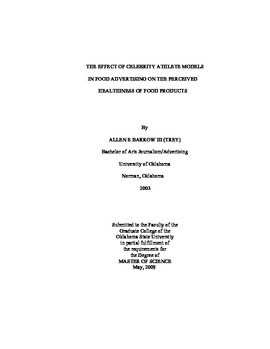| dc.contributor.advisor | Fullerton, Jami A. | |
| dc.contributor.author | Barrow, Allen (Trey) E., III | |
| dc.date.accessioned | 2014-04-16T03:10:02Z | |
| dc.date.available | 2014-04-16T03:10:02Z | |
| dc.date.issued | 2009-05-01 | |
| dc.identifier.uri | https://hdl.handle.net/11244/9701 | |
| dc.description.abstract | Recognizing the seriousness of the obesity problem, the government, consumer groups and parents have put pressure on the food industry to adjust their advertising practices (Seiders & Petty, 2007). The use of certain celebrity athletes in advertisements is particularly concerning as they may be seen as "healthy" role models. Therefore, empirical research is important to understand the potential impact that the presence of the celebrity athlete model poses to food choices. The purpose of this study is to determine how the use of a celebrity athlete model in food advertising affects the perception of healthiness of the advertised food product among college students. The methodology for this study is a simple experimental design using an experimental (treatment) ad and a control ad. Participants were randomly assigned one of three different print ads for a breakfast cereal. One treatment features celebrity endorser Michael Phelps, another treatment features celebrity endorser Eli Manning, and the final treatment features a non-celebrity male model. There were at total of 106 students sampled from Oklahoma State University journalism classes for the questionnaire. The results of the present study indicate that college students in the research sample were not influenced by the presence of a celebrity athlete in food advertising. However, the respondents did rate the ad containing Eli Manning significantly more appealing than the ad containing the control ad and Michael Phelps. This partially confirms what is largely accepted in advertising practices, in that celebrity endorsers do create a more favorable impression of products and brands when they are used in the ads. The fact that Phelps was not rated higher than the control ad in the Attitude toward the Ad scale could largely be due to his recent negative media attention following his drug use scandal. | |
| dc.format | application/pdf | |
| dc.language | en_US | |
| dc.publisher | Oklahoma State University | |
| dc.rights | Copyright is held by the author who has granted the Oklahoma State University Library the non-exclusive right to share this material in its institutional repository. Contact Digital Library Services at lib-dls@okstate.edu or 405-744-9161 for the permission policy on the use, reproduction or distribution of this material. | |
| dc.title | Effect of Celebrity Athlete Models in Food Advertising on the Perceived Healthiness of Food Products | |
| dc.type | text | |
| dc.contributor.committeeMember | McKinnon, Lori | |
| dc.contributor.committeeMember | Ketterer, Stan | |
| osu.filename | BarrowIII_okstate_0664M_10270.pdf | |
| osu.college | Arts and Sciences | |
| osu.accesstype | Open Access | |
| dc.description.department | School of Media and Strategic Communications | |
| dc.type.genre | Thesis | |
